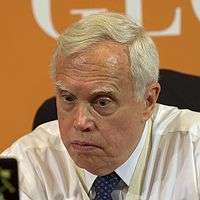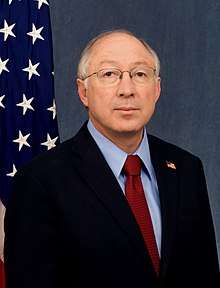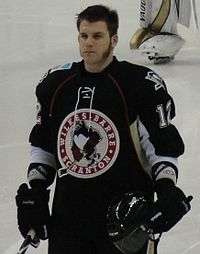Colorado College
The Colorado College is a private liberal arts college in Colorado Springs, Colorado. It was founded in 1874 by Reverend Thomas Nelson Haskell in his daughter's memory. The college enrolls approximately 2,000 undergraduates at its 90-acre (36 ha) campus, 70 miles (110 km) south of Denver. The college offers 42 majors and 33 minors, and has a student-faculty ratio of 10:1.[3] Famous alumni include James Heckman, Ken Salazar, Lynne Cheney, Thomas Hornsby Ferril, Marc Webb, and Steve Sabol. Colorado College has an acceptance rate of 13.5%[4] for the Class of 2023, was ranked as the best private college in Colorado by Forbes,[5] and was listed as tied for the 23rd-best National Liberal Arts College, and as the No. 1 Most Innovative Liberal Arts School, in the 2018 U.S. News & World Report rankings.[6]
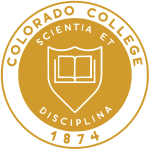 | |
| Motto | Scientia et Disciplina (Latin) |
|---|---|
| Type | Private |
| Established | 1874 |
| Endowment | $766.9 million (2019)[1] |
| President | Jill Tiefenthaler |
| Undergraduates | 2,012 |
| Location | , , United States 38.848°N 104.823°W |
| Campus | Urban, 90 acres |
| Colors | Black and Gold[2] |
| Athletics | NCAA Division III Southern Collegiate Athletic Conference (SCAC) Division I National Collegiate Hockey Conference, men's ice hockey Division I Mountain West Conference, women's soccer |
| Nickname | Tigers |
| Website | coloradocollege |
Colorado College is affiliated with the Associated Colleges of the Midwest. Most sports teams are in the NCAA Division III, with the exception of Division I teams in men's hockey and women's soccer.
History
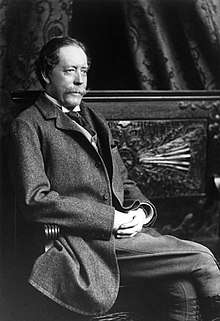
Colorado College was founded in 1874 on land designated by U.S. Civil War veteran General William Jackson Palmer, the founder of the Denver and Rio Grande Railroad and of Colorado Springs.[7] Founder Reverend Thomas Nelson Haskell described it as a coeducational liberal arts college in the tradition of Oberlin College. Like many U.S. colleges and universities that have endured from the 19th century, it now is secular in outlook, and it retains its liberal arts focus.
Cutler Hall, the college's first building, was completed in 1880 and the first degrees were conferred in 1882.
William F. Slocum, president from 1888 to 1917, oversaw the initial building of the campus, expanded the library and recruited top scholars in a number of fields.[7] In 1930, Shove Chapel was erected by Mr. John Gray, to meet the religious needs of the students (though Colorado College is not religiously affiliated).
Katharine Lee Bates wrote "America the Beautiful" during her summer teaching position at Colorado College in 1893.
Academics
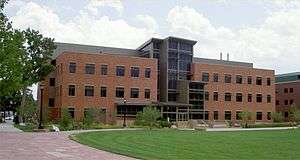
The college offers more than 80 majors, minors, and specialized programs including: Southwest studies, feminist and gender studies, Asian studies, biochemistry, environmental science, neuroscience, Latin American studies, Russian and Eurasian studies, and American cultural studies, as well as an across-the-curriculum writing program. In addition to its undergraduate programs, the college offers a Master of Arts in Teaching (MAT) degree. Tutt Library has approximately half a million bound volumes. In 2012, Colorado College yielded a student-to-faculty ratio of 10:1.[8]
Block plan
Colorado College follows a unique schedule known as the "block plan" in which students study one subject intensively for three-and-a-half-week "blocks", followed by a 4.5 day break. The intensity stems from the time commitment (classes meet for a minimum of three hours Monday through Friday) as well as the demand for engaging rapidly with complex content. Advocates say this allows for more lab time, field research, and an intensive hands-on learning experience with fewer distractions. Critics say that this approach to learning does not allow adequate time for students to digest complex topics.
The block plan epitomizes experiential learning. It is common for classes to take short or extended trips to apply classroom concepts in the real world. Because students only take one course for the duration of the block, professors have the flexibility to develop these types of excursions. For example, a renewable energy course might travel to a local wind farm or a geology class may take a week in Moab, Utah to study geological patterns in the region. A satellite campus in Crestone, Colorado at the base of the Sangre de Cristo Mountains known as "Baca Campus" offers a retreat destination often utilized by language, philosophy, writing, and religion courses. Baca Campus boasts a lodge, conference center, classroom, restaurant, and student townhouse facilities. Some courses will even spend an entire block immersed in an area of interest. These occur both domestically and internationally.
After each block, students are rewarded with 4.5 days off. Most students head off campus, often involving some type of outdoor exploration.
Every student begins the Colorado College journey with a "First Year Experience" course, or FYE. This is a back-to-back block spanning 8 weeks and functions as a freshmen seminar course.
Students can also take blocks during winter and summer breaks. In January, the college offers "half blocks," an intensive 10-day course fulfilling a half credit. Meanwhile, summer blocks are three weeks long, and there are also graduate blocks of differing lengths. In parallel with the students, professors teach only one block at a time. Classes are generally capped at 25 students to encourage a more personalized academic experience.
Admissions
Colorado College is considered a "most selective school" by U.S. News & World Report.[9]
For the Class of 2023 (enrolled fall 2019), Colorado College received a record 9,454 applications (an increase of nearly 1,000 applicants over the Class of 2022) and admitted 13.5%, the lowest acceptance rate in the school's history, with 547 incoming students.[4] Students of color make up 27 percent of the incoming class, 15 percent are Pell Grant recipients, 9 percent first-generation students, and 9 percent international students. Nearly 15 percent of the class is from Colorado (14.6 percent) and 71 of its members are part of the Bridge Scholars Program, which offers a welcoming community, supportive mentoring, and engaging and challenging coursework for first year students.[10]
Additionally, the class include 48 QuestBridge students; QuestBridge is a non-profit organization that matches high-achieving, underserved students with opportunities in higher education. CC is now in the sixth year of its partnership with the QuestBridge organization.[10]
Rankings
| University rankings | |
|---|---|
| National | |
| Forbes[11] | 92 |
| THE/WSJ[12] | 111 |
| Liberal arts colleges | |
| U.S. News & World Report[13] | 27 |
| Washington Monthly[14] | 66 |
In its 2020 edition, U.S. News & World Report ranks Colorado College as tied for 27th best liberal arts college in the nation and No. 3 among the most innovative national liberal arts colleges.[6] The most innovative schools are those "making the most innovative improvements in terms of curriculum, faculty, students, campus life, technology or facilities."[15]
Kiplinger's Personal Finance places Colorado College 16th in its 2017 ranking of best value liberal arts colleges in the United States.[16]
In 2019, Forbes rated it 92nd overall in "America's Top Colleges," which ranked 650 national universities, liberal arts colleges and service academies.
CC is considered a "Hidden Ivy."
Requirements
Students must satisfactorily complete 32 credits to graduate in addition to specifying a major of study and fulfilling those requirements. The college offers a unique alternative for students who wish to design their own major. However, standardized cross-cutting requirements still apply, though these criteria are fairly broad compared to those at comparable colleges.[17]
Student Life
The median family income of Colorado College students is $277,500, the highest of any college or university in the United States, with 54% of students coming from the top 5% highest-earning families and 10.5% from the bottom 60%.[18]
Extracurriculars
The small campus of 2,000 boasts more than one hundred clubs and student groups, ranging from professional groups, interests clubs, and social groups. Among them are intramural sports groups, which have a strong presence on campus. There are intramural teams, ranging from broomball to ultimate frisbee.[19]
Housing
Most students live on or directly adjacent to the college campus. During the first two years of study, students are required to live on campus in one of the student dorms, while apartments and student-owned housing become available as upperclassmen.[20]
Campus
Many of the earliest campus buildings, including Bemis, Cossitt, Cutler, McGregor, Montgomery, Palmer, and Ticknor Halls, are on the National Register of Historic Places, along with Shove Memorial Chapel and the William I. Spencer Center. Arthur House or Edgeplain, once home to the son of President Chester A. Arthur, is also on the National Register.[21]
Since the mid-1950s, newer facilities include three large residence halls, Worner Campus Center, Olin Hall of Science and the Barnes Science Center, Honnen Ice Rink, Boettcher Health Center, Schlessman Pool, Armstrong Hall of Humanities, and the El Pomar Sports Center. The face of campus changed again at the beginning of the 21st century with construction of the Western Ridge Housing Complex, which offers apartment-style living for upper-division students and completion of the Russell T. Tutt Science Center. The east campus has been expanded, and is now home to the Greek Quad and several small residence halls known as "theme houses."
Some of the more recent notable buildings include Tutt Library, designed by Skidmore, Owings & Merrill and later expanded and renovated by Pfeiffer Partners to be the largest carbon-neutral academic library in the United States, Packard Hall of Music and Art, designed by Edward Larrabee Barnes, and the Edith Kinney Gaylord Cornerstone Arts Center, which was designed by Antoine Predock with input from faculty and students.
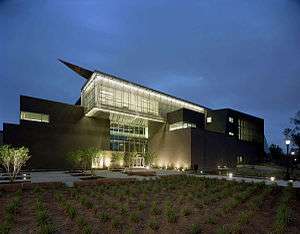
Edith Kinney Gaylord Cornerstone Arts Center
Colorado College's Edith Kinney Gaylord Cornerstone Arts Center, completed in 2008 and located at the intersection of a performing arts corridor in Colorado Springs, is home to the college's film, drama and dance departments and contains a large theater, several smaller performance spaces, a screening room, the I.D.E.A. Space gallery, and classrooms, among other rooms. The building is also LEED certified.
Athletics
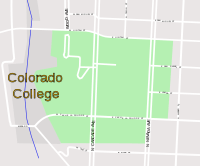
The school's sports teams are nicknamed the "Tigers." Colorado College competes at the NCAA Division III level in all sports except men's hockey, in which it participates in the NCAA Division I National Collegiate Hockey Conference, and women's soccer, where it competes as an NCAA Division I team in the Mountain West Conference. CC dropped its intercollegiate athletic programs in football, softball, and women's water polo following the 2008–09 academic year.[22]
In 1994, a student referendum to change the athletic teams' nicknames to the Cutthroat Trout narrowly failed, by a margin of 468-423.[23]
The Tigers hockey team won the NCAA Division I championship twice (1950, 1957), were runners up three times (1952, 1955, 1996) and have made the NCAA Tournament eighteen times, including eleven times since 1995.[24] In 1996, 1997, and 2005, CC played in the Frozen Four, finishing second in 1996. Fifty-five CC Tigers have been named All-Americans.[25] Hockey Hall of Fame coach Bob Johnson coached the Tigers from 1963 to 1966.[26]
The current hockey coach is Mike Haviland, who had been head coach of the Hershey Bears of the American Hockey League and was an assistant coach for the Chicago Blackhawks of the National Hockey League.
KRCC radio
Colorado College operates National Public Radio Member Station KRCC-FM. In 1944, KRCC began as a two-room public address system in the basement of Bemis Hall. Professor Woodson "Chief" Tyree, Director of Radio and Drama Department at Colorado College was the founder and inspirational force in the program that one day became KRCC-FM. In 1946, KRCC moved to South Hall (where Packard Hall now stands) on campus where two students, Charles "Bud" Edmonds '51, and Margaret Merle-Smith '51, were instrumental in securing a war surplus FM transmitter. KRCC began over the air broadcasting in April 1951 as the first non-commercial educational FM radio station in the state of Colorado.
KRCC broadcasts through a series of eleven transmitters and translators throughout southern Colorado and a portion of northern New Mexico. KRCC's main transmitter, atop Cheyenne Mountain, broadcasts three separate HD multi-cast channels, including a channel run completely by Colorado College students called the SOCC (Sounds of Colorado College).
Notable people
Alumni
Colorado College's alumni include a Nobel Prize winner, a Pulitzer Prize winner, 2 MacArthur Fellows, 14 Rhodes Scholars, 31 Fulbright Scholars, and 68 Watson Fellows.[27] CC has also graduated 18 Olympians[27] and 170 professional hockey players, including over 30 current and former NHL players.[28][29]
Selected notable graduates include:
- William "Bro" Adams, Chair of the National Endowment for the Humanities
- Neal Baer, former executive producer and writer for television series ER, Law & Order: SVU, and Under the Dome
- Dee Bradley Baker, voice actor Star Wars: The Clone Wars (2008 TV series), Star Wars: Rebels
- Anne Basting, winner of 2016 MacArthur Fellowship, Professor of Theater at the University of Wisconsin-Milwaukee
- Austin R. Brunelli, Brigadier general in the Marine Corps, World War II Navy Cross recipient
- David Burnett, photojournalist recognized for the World Press Photo of the Year (1980), co-recipient of the Robert Capa Gold Medal, and named Magazine Photographer of the Year by the National Press Photographers Association
- Elizabeth Cheney, United States Representative for Wyoming
- Lynne Cheney, former Chair of the National Endowment for the Humanities, conservative scholar, and former talk-show host
- Earl H. "Dutch" Clark, first All-American football player from any college or university in Colorado
- Marian W. Clarke, US Representative for New York's 34th congressional district. Second woman elected to the United States Congress from New York
- Diana DeGette, US Representative for Colorado's 1st congressional district
- Gregg Easterbrook, author and contributing editor of The New Republic and The Atlantic Monthly
- Joe Ellis, President of the Denver Broncos
- Thomas Hornsby Ferril, poet laureate of Colorado
- Mark Fiore, Pulitzer Prize-winning political cartoonist
- Peggy Fleming, figure skater, 1968 Olympic champion in ladies' singles and a three-time world champion
- Paul Franco, political theorist and professor of government at Bowdoin College
- Jennifer Galt, current United States Ambassador to Mongolia
- Lori Garver, former deputy NASA administrator
- Abdul Aziz Abdul Ghani, former prime minister of Yemen
- Glenna Goodacre, sculptor
- Richard Green, chairman of the Space Sciences Institute, previously served as President and CEO of CableLabs
- James D. Hamilton, econometrician and author of "Time Series Analysis"
- Donna Haraway, scholar in the field of science and technology studies
- James Heckman, winner of the Nobel Memorial Prize in Economics (2000), John Bates Clark Medal (1983), and Frisch Medal (2014), currently appointed as Henry Schultz Distinguished Service Professor of Economics at the University of Chicago
- Kaui Hart Hemmings, author of The Descendants
- Laura Hershey, writer and disability rights activist
- David Jenkins, 1960 Olympic gold medalist in men's figure skating, three-time world champion (1957–1959)[30]
- Daniel Junge, Academy Award-winning filmmaker of the documentary Saving Face
- Margaret Kilgallen, artist and member of the Mission School art movement
- Liang Shih-chiu, scholar and author who produced the first translation of Shakespeare's complete works into Chinese
- Jane Lubchenco, marine ecologist and environmental scientist, former head of NOAA
- David Malpass, President of the World Bank
- Reginald McKnight, author, recipient of the Drue Heinz Literature Prize, the Whiting Award, and the O. Henry Award. Inaugural Hamilton Holmes Professor of English at the University of Georgia.
- Marcia McNutt, geophysicist, President of the National Academy of Sciences[31]
- Helen Stevenson Meyner, US Representative for New Jersey's 13th congressional district
- Pete Nelson, host of the Animal Planet television show Treehouse Masters
- Tara Nott, first American gold medalist in women's weight lifting, 2000 Olympics[32]
- John Novembre, winner of 2015 MacArthur Fellowship, Professor of Computational Biology at the University of Chicago
- Philip Perry, former general counsel for the Department of Homeland Security
- Doug Pray, Emmy Award-winning film director (Art & Copy)
- Paul Reville, Former Massachusetts Secretary of Education
- Frederick Madison Roberts, first African-American elected to public office on the West Coast and great-grandson of Sally Hemings
- Gregor Robertson, mayor of Vancouver, British Columbia, Canada
- Steve Sabol, President of NFL Films
- Ken Salazar, 50th United States Secretary of the Interior, former United States Senator
- Harry H. Seldomridge, US Representative for Colorado's 2nd congressional district
- Aaron Shure, American television writer, director, and producer
- Joe Simitian, former mayor of Palo Alto
- Jen Sincero, writer[33]
- Ed Smith, former NFL player for the Denver Broncos[34]
- Kagen Sound, puzzle artist
- Brett Sterling, NHL ice hockey player
- Bert Stiles, author and World War II fighter pilot awarded the Distinguished Flying Cross and the Air Medal
- Timothy Tymkovich, Chief Judge of the United States Court of Appeals for the Tenth Circuit
- Abigail Washburn, Grammy Award-winning banjo player and songwriter
- Marc Webb, producer and director of music videos and films such as (500) Days of Summer and The Amazing Spider-Man
- Terry Winograd, professor of computer science at Stanford University and co-director of the Stanford Human-Computer Interaction Group
- Dean Winters, actor (Rescue Me, Battle Creek, Oz, Law and Order: SVU,"30 Rock")
- Jeremy Zucker, singer-songwriter
Faculty and staff
Notable faculty members include:
- Ofer Ben-Amots, classical composer
- Rebecca Barnes, environmental scientist, educator and advocate for women in science, board member of Earth Science Women's Network
- Peter Blasenheim, Latin American & African historian, as well as Brazilianist[35][36]
- Florian Cajori, author of A History of Mathematics
- Dick Celeste, former Governor of Ohio, US Ambassador to India, and Director of the Peace Corps, College President 2002 - 2011
- Tom Cronin, former president of Whitman College
- Edward Diller, German literary scholar and author
- Jesse Glenn Gray, author of The Warriors: Reflections of Men in Battle
- Steve Hayward, novelist[37] and co-creator/co-host of Critical Karaoke radio broadcast
- Linda Hogan (b. 1947), Native American author and poet
- Anne F. Hyde, historian, author, 2012 Bancroft Prize winner,[38] 2012 Pulitzer Prize finalist[39]
- Dan Johnson, microeconomist and entrepreneur, notable for research in predicting Olympic medals[40]
- David Mason, Poet Laureate of Colorado
- Jim Parco, author, businessman, and retired Air Force Lieutenant Colonel
- Andrew Price-Smith, academic writer, best known for his work on health security and environmental security
- Renee Rabinowitz, psychologist and lawyer
- Stephen Scott, founder of the Bowed Piano Ensemble
- Dennis Showalter, 2018 recipient of the Pritzker Literature Award for Lifetime Achievement in Military Writing and 2005 recipient of the Samuel Eliot Morison Prize for Lifetime Achievement in Military History
- Christine Siddoway, geologist and Antarctic investigator, best known for advances in geological knowledge of West Antarctica
- Leila Clement Spaulding, the first female faculty member of Colorado College with a PhD
- Jill Tiefenthaler, President 2011–present
References
- As of June 30, 2019. "U.S. and Canadian 2019 NTSE Participating Institutions Listed by Fiscal Year 2019 Endowment Market Value, and Percentage Change in Market Value from FY18 to FY19 (Revised)". National Association of College and University Business Officers and TIAA. Retrieved April 20, 2020.
- "Visual Identity Resources". coloradocollege.edu. Colorado College.
- "Departments and Program". coloradocollege.edu. Colorado College.
- "Welcome, Class of 2023!".
- "America's Top Colleges: Colorado". Forbes.com.
- "Colorado College". U.S. News & World Report.
- Colorado College. History of Colorado College Archived May 27, 2010, at the Wayback Machine. Retrieved on: 2010-05-19.
- "Colorado College". locatecolleges.com.
- "Colorado College". U.S. News & World Report. 2016.
- "Class of 2022".
- "America's Top Colleges 2019". Forbes. Retrieved August 15, 2019.
- "U.S. College Rankings 2020". Wall Street Journal/Times Higher Education. Retrieved September 26, 2019.
- "Best Colleges 2020: National Liberal Arts Colleges Rankings". U.S. News & World Report. Retrieved September 8, 2019.
- "2019 Liberal Arts Rankings". Washington Monthly. Retrieved September 8, 2019.
- "Most Innovative Schools – National Liberal Arts Colleges". U.S. News & World Report. 2020.
- "Kiplinger's Best College Values: College Rankings, 2017". Kiplinger's Personal Finance. December 2017.
- "Requirements • Colorado College". Archived from the original on October 3, 2017. Retrieved October 2, 2017.
- Aisch, Gregor; Buchanan, Larry; Cox, Amanda; Quealy, Kevin (January 18, 2017). "Economic diversity and student outcomes at Colorado College". The New York Times. Retrieved August 9, 2020.
- The Curriculum • Colorado College
- On-Campus Housing • Housing & Conferences Colorado College
- El Paso County – Colorado State Register of Historic Properties Archived December 24, 2013, at the Wayback Machine. History Colorado. June 8, 2013.
- Tough Times, Tough Decisions: Athletics Cuts at CC | Bulletin
- The Trout that Almost Was | Cipher
- Colorado College | Ice Hockey History NCAA Tournament Archived September 22, 2006, at the Wayback Machine
- Colorado College | Ice Hockey History All-Americans Archived February 11, 2007, at the Wayback Machine
- Colorado College | Ice Hockey History Coaches Archived September 22, 2006, at the Wayback Machine
- "After CC". Colorado College.
- "Alumni Report". Internet Hockey Database. 2011. Retrieved May 11, 2011.
- "Tiger Hockey Media Guide 2013–2014" (PDF). Retrieved November 30, 2013.
- "David Jenkins". Archived from the original on April 17, 2020.
- "Marcia McNutt Elected 22nd NAS President; New Treasurer, Council Members Chosen" (Press release). National Academy of Sciences. February 16, 2016. Archived from the original on February 21, 2016. Retrieved February 23, 2016.
- "After CC • Colorado College". Colorado College. Retrieved February 29, 2012.
- Grant, Katie (September 4, 2018). "The Road to Writing Is Not Always Paved". Colorado College Bulletin.
- Ed Smith, DE at NFL.com
- "Profile • History • Colorado College". Colorado College. Retrieved February 29, 2012.
- "Peter Blasenheim". Colorado College. Archived from the original on May 27, 2011. Retrieved February 29, 2012.
- Hayward, Steven (2011). Don't Be Afraid. Knopf Canada. pp. 313. ISBN 978-0676977363.
- "Winners of the 2012 Bancroft Prize Announced". Retrieved December 10, 2012.
- "2012 Finalists". Retrieved December 10, 2012.
- William Heuslein (January 19, 2010). "The Man Who Predicts The Medals". Forbes.
Further reading
- Dunn, Joe P., "A Mission on the Frontier: Edward P. Tenney, Colorado College, the New West Education Commission, and the School Movement for Mormons and ‘Mexicans,’" History of Education Quarterly, 52 (Nov. 2012), 535–58.
- Loevy, Robert D. Colorado College: A Place of Learning, 1874–1999. Colorado Springs: Colorado College, 1999.
- Reid, J. Juan. Colorado College: The First Century, 1874–1974. Colorado Springs: Colorado College, 1979.
External links
![]()
| Wikisource has the text of the 1905 New International Encyclopedia article Colorado College. |
